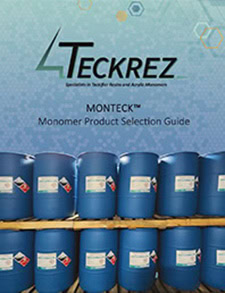MONTECK™ Other Specialties
Other Specialties
Specialty Monomers for Industrial and Chemical Applications
Specialty monomers encompass a diverse group of high-value building blocks designed to impart unique performance characteristics to polymers and formulations. These include Acrylonitrile, Diallyldimethylammonium Chloride (DADMAC), Ethylidene Norbornene (ENB), Methacrylamidopropyl Trimethyl Ammonium Chloride (MAPTAC), and N-Vinylpyrrolidone (NVP)—each offering distinct functionality and versatility. Collectively, these monomers support innovation across industries ranging from water treatment and oilfield chemicals to advanced resins, adhesives, and specialty coatings.
Specialty monomers are prized for their ability to deliver attributes such as cationic charge density (for flocculants and retention aids), enhanced thermal stability, unique crosslinking chemistry, and improved adhesion. By enabling tailored polymer properties—such as water solubility, chemical resistance, or compatibility with demanding end-use environments—these compounds allow formulators to engineer performance at a molecular level. From municipal and industrial water treatment to elastomers, pharmaceuticals, and high-performance coatings, specialty monomers provide the precision and reliability required in today’s advanced chemical applications.

